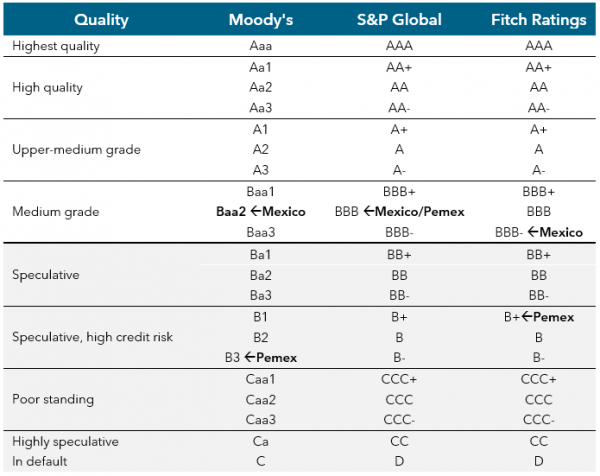Moody’s Changes Mexico Outlook to Negative: What Is at Play?
Delia Paredes & Genevieve Signoret
(Hay una versión en español de este artículo aquí.)
If Mexico loses its investment-grade rating, it will have profound implications for the country, both in terms of market confidence and the cost of financing. Moody’s recent change in outlook for Mexico’s sovereign debt rating could be an early sign that the nation is approaching this critical threshold.
On 14 November 2024, the credit rating agency Moody’s changed Mexico’s sovereign debt outlook from stable to negative, maintaining its Baa2 rating. While this adjustment does not constitute an immediate downgrade, it does serve as a warning: it indicates that risks are being observed that could materialize into a future downgrade in the next six to 24 months.
Moody’s made this decision before reviewing Mexico’s 2025 Economic Package, suggesting that their assessment is based on structural factors beyond the scope of specific policies for a single fiscal year.
When a credit rating agency changes a country’s outlook to negative, it signals that future risks have increased and that a downgrade could be on the horizon in the short to medium term. For Mexico, this is particularly meaningful, because Moody’s and S&P Global have Mexico rated only two notches above speculative grade and Fitch Ratings has it rated just one notch above. Should two out of the three major agencies were to classify Mexico’s sovereign debt as “speculative,” the country would lose its investment-grade status. This would not only increase borrowing costs for the public and private sector both.
Moody’s decision stems from their concerns as to the government’s ability to maintain fiscal and economic stability amid weakening institutional and policy frameworks, which could hurt fiscal accounts and the economy. Additionally, the agency is increasingly concerned about the likelihood that Pemex’s financial obligations will become the government’s responsibility. If Pemex were to continue to incur losses, it could worsen the government’s debt and interest burdens.
Although Mexico is expected to benefit from the nearshoring trend, Moody’s warns that constitutional reforms and potential changes to the USMCA in 2026 could undermine investor confidence, affecting growth and government revenue.
At present, only Moody’s has changed Mexico’s outlook to negative. S&P Global and Fitch Ratings continue to maintain stable outlooks, but, if signs of fiscal and institutional deterioration persist, that could change.
Mexico is two notches from losing its investment grade per Moody’s and S&P Global, and only one per Fitch
Credit ratings for main agencies

Source: Bloomberg.
TransEconomics delivers serenity to high–net-worth families and individuals through holistic wealth management and international alternative asset management. To learn more, request an appointment with an advisor.

